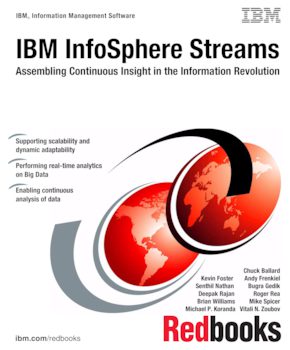
Published on 10 October 2011, updated 03 May 2012
Read in Google Books Order hardcopy
Share this page:
ISBN-10: 0738436151
ISBN-13: 9780738436159
IBM Form #: SG24-7970-00
Authors: Chuck Ballard, Kevin Foster, Andy Frenkiel, Bugra Gedik, Michael P. Koranda, Senthil Nathan, Deepak Rajan, Roger Rea, Mike Spicer, Brian Williams and Vitali N. Zoubov
Abstract
In this IBM® Redbooks® publication, we discuss and describe the positioning, functions, capabilities, and advanced programming techniques for IBM InfoSphere™ Streams (V2), a new paradigm and key component of IBM Big Data platform. Data has traditionally been stored in files or databases, and then analyzed by queries and applications. With stream computing, analysis is performed moment by moment as the data is in motion. In fact, the data might never be stored (perhaps only the analytic results). The ability to analyze data in motion is called real-time analytic processing (RTAP).
IBM InfoSphere Streams takes a fundamentally different approach to Big Data analytics and differentiates itself with its distributed runtime platform, programming model, and tools for developing and debugging analytic applications that have a high volume and variety of data types. Using in-memory techniques and analyzing record by record enables high velocity. Volume, variety and velocity are the key attributes of Big Data. The data streams that are consumable by IBM InfoSphere Streams can originate from sensors, cameras, news feeds, stock tickers, and a variety of other sources, including traditional databases. It provides an execution platform and services for applications that ingest, filter, analyze, and correlate potentially massive volumes of continuous data streams.
This book is intended for professionals that require an understanding of how to process high volumes of streaming data or need information about how to implement systems to satisfy those requirements.
See: http://www.redbooks.ibm.com/abstracts/sg247865.html for the IBM InfoSphere Streams (V1) release.
Table of Contents
Chapter 1. Introduction
Chapter 2. Streams concepts and terms
Chapter 3. Streams applications
Chapter 4. InfoSphere Streams deployment
Chapter 5. Streams Processing Language
Chapter 6. Advanced Streams programming
Chapter 7. Streams integration approaches
Appendix A. InfoSphere Streams installation and configuration
Appendix B. Toolkits and samples
Appendix C. Additional material